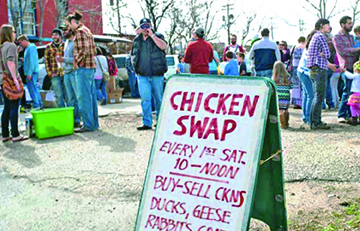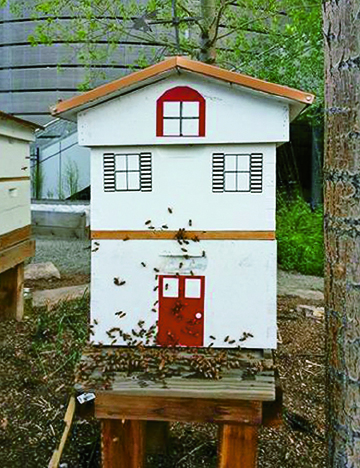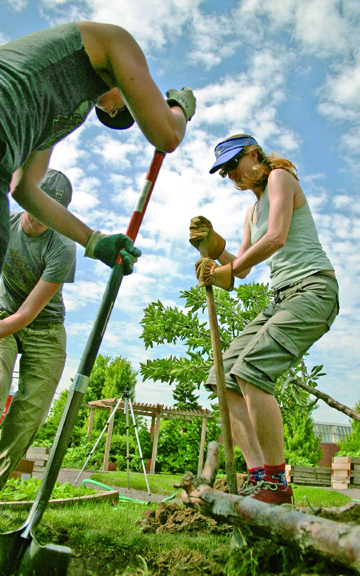Rules Hatched By City Council Also Allow Homegrown Sales In Kitchens, Yards Until Dusk
by Glen Richardson
Have you heard the buzz?
If not, step into your backyard and listen for the hum of bees. If you pay close attention you may also hear the sounds of chickens, ducks and goats! They’re some of the reverberations to expect as the Cherry Creek Valley rototills into full-fledged backyard farming. What’s more, anticipate that your street will also become one big Farmers’ Market as neighbors begin to sell their farm produce in their kitchens and from their front yards.
In July the Denver City Council approved a new law that allows residents to both raise and sell fresh produce they have grown themselves and “cottage foods” such as jams and honey they have made themselves in their home kitchens. Under the new law which took effect July 18, residents are required to purchase a permit but then will be able to sel l from home raw and uncut fresh fruit, vegetables and herbs that were grown by the seller either on site or in a community garden.
l from home raw and uncut fresh fruit, vegetables and herbs that were grown by the seller either on site or in a community garden.
City Farming Rules
Urban farmers will now be able to sell whole eggs produced by chickens or ducks kept by the seller at home or as un-refrigerated food products made on-site such as spices, teas, honey, jams and certain baked goods made themselves in their home kitchens. Under the law people can sell from inside or outside their home from 8 a.m. to dusk and can sell up to $5,000 worth of goods and produce a year.
The city requires that urban farmers apply for licenses to sell their food. The city charges a one-time fee of $20 for the license. Urban farmers setting up indoor or outdoor farmer markets are not required to provide parking spaces. No sales tax is required and the seller determines the sales prices. For neighborhood farmer markets only temporary, portable furniture is allowed — tables, stands and umbrellas — for outdoor sales and they must be taken inside between dusk and 8 a.m. daily. Signs for home sales must be flat, attached to a wall or window of the home, and cannot be more than 100 square inches in size. One sign is allowed per street front (one sign for most lots, two signs for a corner lot). No moving signs and no lit sign(s) are allowed.
Several city restaurants currently grow produce in gardens and farms they own and sell them in their local eateries. Now those plus other restaurants that don’t have gardens and farms will be able to buy vegetables, eggs, jams, and fruits being grown in the neighborhood by backyard farmers.
Hatching Big Ideas
As the backyard chicken craze spreads like wildfire it’s beginning to seem like the chicken coop is the new doghouse. Increasingly Valley fidos will have to share the yard with the ladies. But before getting in a flap with your pup be aware that sales of whole, fresh chicken eggs are limited to less than 250 dozen per month.
According to rules hatched by the city, egg cartons must include the origin of the eggs and the packing date. Unless the eggs were treated to prevent salmonella, the label must include safe handling instructions: To prevent illness from bacteria, keep eggs refrigerated, cook eggs until yolks are firm, and cook any foods containing eggs thoroughly. Cartons must be labeled: “These eggs do not come from a government-approved source.”
Eggs, produce and other products sold by urban farmers must have a label and be traceable to the seller. Labels must list the name of the product, the producer’s name address, telephone number and email. Items must also include where the food was prepared or grown, the date the food was produced and a complete list of ingredients. If a product was produced in a home kitchen that is not subject to state licensure or inspection and that may also list common food allergens such as tree nuts, peanuts, eggs, soy, wheat, milk, fish and crustacean shellfish, labels should read: This product is not intended for resale.
Who’s Digging In?
Who are these upstart urban farmers with enthusiasm for having dirt under their finger nails, bees and chickens in their backyard, and fresh food in their bellies? It’s locals like Brenna Brooks-Larson, a Valley elementary school teacher who helped launch Celebration Community Farm in the Virginia Village neighborhood on the corner of Iowa and Birch. She grew up in Denver and is now a board member of UrbiCulture Community Farms. Her love for farming began in Nicaragua as a Peace Corps volunteer where she managed three school gardens. Or gardening volunteers like Maggie Rice, the second woman in Colorado to become a Certified Working Chef. She is building a Permaculture Institute on 1.5 acres 10 minutes from downtown Denver.
Also among the back-to the-land group is James Bertini, a lawyer turned farmer whose backyard on Fourth Ave. and Kalamath has chickens, rabbits and a garden plot. His interest in farming began with his wife Irena’s dissatisfaction with the prevalence of processed foods. The pair own and operate Denver Urban Homesteading — a year-round farmers market on Santa Fe — selling locally grown produce and foodstuffs. A horde of backyard farmers can be found buying chickens, rabbits and other backyard critters at a livestock exchange sponsored by the couple each month.
Many like Jason Plotkin — Farm Manager at Lowry’s Ekar Farm & Community Garden — got into farming to help neighbors and society in general. The farm hosts 50 community garden plots within the diverse Lowry neighborhood. Ekar engages 1,000 community volunteers in growing 25,000 pounds of urban organic vegetables. The farm donated 85 percent of the vegetables grown — with a market value of $95,000 — to Jewish Family Service, Weinberg Food Pantry and other food relief agencies that feed 2,500 people a month during the harvest season.
Cultivating Change
The Valley’s backyard farming boom began more than 25 years ago when the nonprofit Denver Urban Gardens (DUG) began working with the community to build and support gardening. The organization currently organizes and manages well over 100 community gardens, including 35 at Valley schools. By 1993, DUG was coordinating 21 local gardens, and by 1997, 32 new gardens and DeLaney Community Farm were established. Within the past decade it has created multiple ongoing youth and community education programs designed to assist community involvement and long-term garden sustainability.
Another significant backyard farming venture is the community farm at Valley-based Denver Green School, run by Sprout City Farms. It is a one-acre organic farm located along East Virginia Ave. Produce from the farm is used for the school salad bar as well as in cooked meals for about seven out of the nine months during the school year. The farm is able to meet nearly all the produce needs for the school kitchen from August to October. Sprout Farms believes the future of urban agriculture requires a shift in thinking, eating and acting.
Even the city has gotten into the backyard-farming act with a plot on the grounds of the Colorado Convention Center. Known as Blue Bear Farm, the 5,000-square-foot farm is located on the sunny south side of the convention building. Beds bloom with crops of fresh fruits, vegetables and herbs that are used by Centerplate chefs at the Convention Center. Basil, beans, peppers and parsnips plus radishes and raspberries are among crops grown. The farm has two beehives providing fresh honey to convention attendees.

